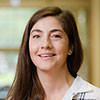This article is more than 5 years old.
In this installment of the 5 Questions series, we’re talking with Peyton Barr (’15), our Wake Forest Fellow, about his experience at ZSR. During his fellowship, Peyton has worn several hats – from working alongside the ZSR Administrative Team on a broad range of projects and events, to serving as a member of ZSR Library Committees, to collaborating with other University departments on special events and outreach opportunities – and here, he offers us an insider’s account of life as the Wake Forest Fellow for the ZSR Library.
Peyton, you worked at ZSR as a student assistant during your undergraduate experience at Wake Forest, how has your view of ZSR changed from your work experience as the ZSR Fellow?
My fellowship has obviously been on a broader scale and I’ve enjoyed experiencing the entire library operation–Wake Will campaign work, various committees, and student outreach. I’ve come to know the innovation employed at ZSR and how we really serves at the forefront of library operations in the twenty-first century. But most of all, our faculty and staff are amazing. Getting to know everyone at ZSR made me value the familial and engaging culture. It will be hard to find something similar in my next step after the fellowship.
Looking back on your fellowship, what have been some of your favorite projects you’ve worked on during your appointment?
As a member of the assessment committee, I was charged with evaluating new data collection software which the library may chose to use in the future. It felt like a daunting task at first but I enjoyed jumping into something and learning as much as possible about the different departments and operations in ZSR. It was basically a big cost/benefit analysis project and it was meaningful work.
I also enjoy working with the Council of Advocates, the development board for the library. It’s inspiring to know that WFU alumni, parents, and friends care deeply enough about the library to give time, energy, and money towards its improvement. The Council has helped the library define its place on campus and ensure a sustainable future. I find a lot of value in the interpersonal aspects of development work so the Council has been a lovely partner.
The library is always partnering with different programs on campus such as Thrive and Global Programs. Helping other departments accomplish their goals through the library is always fun.
What is your favorite ZSR memory as a student and what is your favorite ZSR memory as an employee?
As a student, I’ll never forget one thing: Wake the Library food at midnight. It was a much needed break during exam weeks and I’ve never heard of another library doing something similar.
Ironically, the first all-nighter I pulled in ZSR was as a fellow, not as a student, but it’s also my fondest memory. We stayed up all night for Writers Camp–a lock-in style program in which students publish a book in twelve hours. I had so much fun passing time with colleagues over meaningful conversations, hilarious jokes, and many cups of coffee. And the students did spectacularly! I learned a lot and bonded with ZSR librarians in a unique library circumstance.
Has your opinion of libraries and/or librarians changed? How so?
Absolutely. I learned that librarians (or at least the best ones) defy the stereotypes of a traditional librarian. They are open-minded, accepting of technological advances, and invested in the entire education of a student. Librarians erase the seam between a student’s academic potential and the realization of that potential by encouraging meaningful intellectual pursuits and showing students how to learn (if they don’t already know how). It’s so much more than knowing how to navigate a library catalog or covering your citation bases in bibliographies. In short, librarianship is fun, cutting-edge, and interdisciplinary.
What lessons have you learned from your fellowship experience that you will use in future work experiences?
Never say “no” (or at least rarely say ‘no’). ZSR is a “yes first” institution–if there’s a problem or someone has an idea, we always try it first and then if we can’t do it, we’ll find who can. I’ve learned a lot by trying different projects, some of which I didn’t think I would enjoy. If you never say “no”, you’ll always be doing challenging work, you’ll always be helping someone, and you’ll always be improving yourself. Being a “yes first” organization cultivates an exciting positivism in the work and makes life more engaging.
